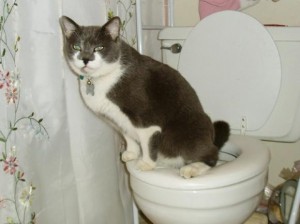Avoid Clogs and Damage: Don't Flush Cat Poop Down Your Toilet - Expert Recommendations
Avoid Clogs and Damage: Don't Flush Cat Poop Down Your Toilet - Expert Recommendations
Blog Article
What are your beliefs about Can You Flush Cat Poop Down The Toilet??

Intro
As feline proprietors, it's important to bear in mind how we deal with our feline pals' waste. While it may appear hassle-free to flush feline poop down the toilet, this practice can have destructive consequences for both the environment and human health and wellness.
Alternatives to Flushing
Thankfully, there are safer and a lot more accountable methods to dispose of cat poop. Think about the adhering to alternatives:
1. Scoop and Dispose in Trash
The most common technique of throwing away feline poop is to scoop it right into an eco-friendly bag and throw it in the trash. Make sure to utilize a devoted litter inside story and get rid of the waste immediately.
2. Usage Biodegradable Litter
Select eco-friendly pet cat clutter made from products such as corn or wheat. These clutters are eco-friendly and can be securely taken care of in the garbage.
3. Hide in the Yard
If you have a lawn, consider hiding pet cat waste in a marked location far from vegetable gardens and water sources. Make certain to dig deep enough to stop contamination of groundwater.
4. Mount a Pet Waste Disposal System
Purchase an animal waste disposal system specifically made for feline waste. These systems use enzymes to break down the waste, lowering smell and ecological effect.
Health and wellness Risks
In addition to environmental concerns, purging pet cat waste can likewise position wellness dangers to humans. Pet cat feces might include Toxoplasma gondii, a parasite that can create toxoplasmosis-- a possibly serious illness, specifically for expectant females and individuals with damaged immune systems.
Ecological Impact
Flushing pet cat poop presents unsafe pathogens and bloodsuckers right into the water system, posing a significant threat to marine environments. These pollutants can adversely impact aquatic life and concession water high quality.
Conclusion
Responsible pet dog ownership prolongs beyond supplying food and sanctuary-- it additionally involves correct waste administration. By avoiding purging feline poop down the toilet and going with alternative disposal techniques, we can minimize our ecological impact and safeguard human health and wellness.
Why Can’t I Flush Cat Poop?
It Spreads a Parasite
Cats are frequently infected with a parasite called toxoplasma gondii. The parasite causes an infection called toxoplasmosis. It is usually harmless to cats. The parasite only uses cat poop as a host for its eggs. Otherwise, the cat’s immune system usually keeps the infection at low enough levels to maintain its own health. But it does not stop the develop of eggs. These eggs are tiny and surprisingly tough. They may survive for a year before they begin to grow. But that’s the problem.
Our wastewater system is not designed to deal with toxoplasmosis eggs. Instead, most eggs will flush from your toilet into sewers and wastewater management plants. After the sewage is treated for many other harmful things in it, it is typically released into local rivers, lakes, or oceans. Here, the toxoplasmosis eggs can find new hosts, including starfish, crabs, otters, and many other wildlife. For many, this is a significant risk to their health. Toxoplasmosis can also end up infecting water sources that are important for agriculture, which means our deer, pigs, and sheep can get infected too.
Is There Risk to Humans?
There can be a risk to human life from flushing cat poop down the toilet. If you do so, the parasites from your cat’s poop can end up in shellfish, game animals, or livestock. If this meat is then served raw or undercooked, the people who eat it can get sick.
In fact, according to the CDC, 40 million people in the United States are infected with toxoplasma gondii. They get it from exposure to infected seafood, or from some kind of cat poop contamination, like drinking from a stream that is contaminated or touching anything that has come into contact with cat poop. That includes just cleaning a cat litter box.
Most people who get infected with these parasites will not develop any symptoms. However, for pregnant women or for those with compromised immune systems, the parasite can cause severe health problems.
How to Handle Cat Poop
The best way to handle cat poop is actually to clean the box more often. The eggs that the parasite sheds will not become active until one to five days after the cat poops. That means that if you clean daily, you’re much less likely to come into direct contact with infectious eggs.
That said, always dispose of cat poop in the garbage and not down the toilet. Wash your hands before and after you clean the litter box, and bring the bag of poop right outside to your garbage bins.
https://trenchlesssolutionsusa.com/why-cant-i-flush-cat-poop/

As a fervent person who reads about How to Dispose of Cat Poop and Litter Without Plastic Bags, I thought sharing that post was a smart idea. Sharing is good. One never knows, you might be doing someone a favor. I cherish reading our article about Don’t flush cat feces down the toilet.
Schedule Appointment Now Report this page